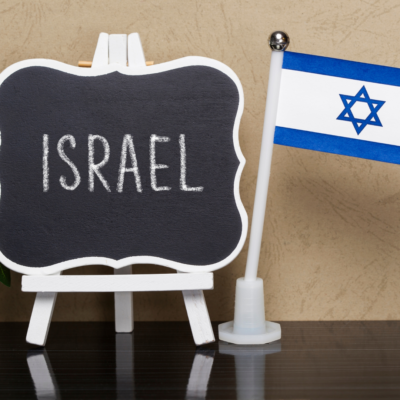Unpacking “Israelism” in the context of Israel education
The controversial documentary “Israelism,” by directors Eric Axelman and Sam Eilersten, has caught the eye of many within the world of Israel Education. The film, produced by disillusioned young American Jews features the experiences of Simone Zimmerman, co-founder of IfNotNow, and Eitan, a former IDF soldier who grew up in Atlanta. Throughout the film, Simone and Eitan share their stories of disenchantment with the image of Israel they were exposed to and their frustration with the narratives they were and were not presented in their American Jewish communities.
Reflections on why this matters
Although the film presents a one-sided critique of Israel advocacy and Zionism, it raises critical questions about how Jewish institutions educate and engage young Jews around Israel.
A 2018 study found that many Jewish day school alumni felt deeply frustrated with their Israel education, finding it overly simplistic, failing to engage with critiques of Israel that are prevalent in the outside world, and portraying an unrealistically positive perception of Israel that doesn’t reflect the complex reality in Israel today. These criticisms were expressed by alumni who were classified as “Devoted” (active and enthusiastic) as well as those classified as “Disillusioned” (connected and frustrated).
While there is value in celebrating Israel’s achievements, advocating for Israel, and encouraging aliyah, and while a goal of Israel education should be cultivating a personal connection with Israel as part of one’s Jewish identity, it should not be at the expense of debate and critical thinking around complex issues in Israel’s history and society today. Only exposing students to one-sided narratives about Israel can lead a student to feel ideologically isolated or alienated for beliefs that might deviate from a view of Israel taught through a more didactic or dogmatic approach.
At its best, Israel education prepares young students for the diverse perspectives and real challenges they encounter later in life. Inclusive Israel education creates opportunities for fair-minded and critical conversations about Israel, engaging students of diverse perspectives and addressing big questions with complexity and nuance.
By incorporating more balanced and honest discussions about Israel’s challenges and realities, Israel educators can foster a more robust understanding and appreciation of Israel. Such an approach not only prevents feelings of betrayal when they encounter opposing views or contradicting evidence but also deepens their connection and love for Israel, recognizing its strengths and acknowledging its struggles.
Let’s unpack three main critiques in “Israelism” of the way Israel is sometimes taught and discuss how Israel education as we at Unpacked for Educators understand it can address them.
Three key issues expressed by “Israelism”
Issue #1: Sheltering students from challenging topics and vocabulary.
A common theme in the stories of Simone and Eitan throughout the film is that these Jewish day school graduates were ignorant of many of Israel’s most common critiques. Simone shares her experience at the University of California, Berkeley when the student senate voted on a BDS bill, when she was “thrown into all these conversations where people were throwing around all these words that I’d never heard before: occupation, settlements, apartheid, ethnic cleansing.”
Not only did Simone feel ignorant, but also unprepared to participate in critical conversations around Israel or respond to harsh accusations. Simone describes using pro-Israel talking points but feeling “really embarrassed by it, because mostly I felt like we weren’t doing a good job refuting their arguments. Do we not have an actual counter-argument besides, like, rockets, double-standard, antisemitism?”
Simone added that she didn’t have those conversations in the safe spaces of her Jewish community. As she put it: “I wanted to know answers from within my own community and nobody could answer those questions for me.”
A quote that is featured twice in the documentary illustrates Simone’s struggle with the feeling of being sheltered from certain topics. Simone asks, “what is this thing that is so horrifying that you can’t bear to let me see it?” The assumption shared in the documentary is that by not exposing students to Israel’s mistakes, gray areas, and challenging realities on the ground, Israel educators must be hiding an unbearable and indefensible reality.
As a result, Simone seeks out information on her own and finds that witnessing the suffering of Palestinians for the first time as an adult “would really shock me and horrify me.” Simone calls this experience one of people “tak[ing] off their blinders” and finding the reality “intolerable.”
How Israel education can address this issue: Provide nuance and complexity for the cultivation of a mature Zionism.
Professor Hanan Alexander explains that Israel education yields a mature Zionist perspective: “This perspective maintains the legitimacy of a Jewish and democratic state according to multiple interpretations of the Zionist idea, provided they appreciate Israel’s complexities, based on a critical engagement with concrete realities, grounded in a fair assessment of the relevant scholarship.”
Israel education must promote an accurate perception of Israel, as both strong and vulnerable, heroic and complex, beautiful and not without its blemishes. We shouldn’t gloss over difficult events and issues in Israeli history and current events. We cannot avoid discussing challenging topics.
Israel education must also teach beyond talking points, by providing historical context and fostering lively, constructive debate. Not only is this approach educationally sound, but it better prepares students for challenging discussions with people who disagree with their views. As Dr. Rachel Fish explains, “surface-level slogans and talking points aren’t an effective means of swaying opinions.”
Furthermore, Israel educators should recognize that the spaces they hold are the safest possible context in which to explore difficult questions, more so than encountering them for the first time on a college campus or social media platform.
How is this done in practice? Israel educators should share a diversity of perspectives and narratives when teaching about Israel’s history, culture, and politics. Each community should find the developmentally appropriate time and way to introduce students to challenging topics.
Expose students to accusations of apartheid, occupation, settler colonialism, racism, and ethnic cleansing (we have a video series on these questions here).
Teach competing and complex narratives, such as the 1948 War of Independence, Deir Yassin, and the Nakba (listen to Unpacking Israeli History to explore these complexities).
Discover the diversity of Israeli society by learning about groups like Mizrahi and Druze Israelis, while also studying the challenges of these groups like the story of the Israeli Black Panthers movement (we have a video series on Israeli diversity here).
Implementing nuanced Israel education helps students become knowledgeable about Israeli history and current events, aware of the complexities of Israeli society, and personally connected to the people and story of Israel.
Issue #2: Leaving out Palestinian narratives when teaching about the Israeli-Palestinian conflict.
The film critiques the lack of awareness of American Jews of Palestinian narratives, history, struggles, and views. In the documentary, Palestinian educator Baha Hilo, states that American Jews “know nothing about Palestine and Palestinians, or have no idea about what Palestinians are going through.”
Eitan and Simone both shared that their knowledge of Palestinian history and identity were woefully lacking.
Eitan said that throughout his extensive Israel education, “we never really discussed the Palestinians,” and that he simply knew that Palestinians exist, “and they just want to kill us all, and want us to leave the land.”
Simone echoed Eitan’s experience, saying, “I just don’t think I had any conception of anything about what it means to be a Palestinian besides that it means that you’re a person who kills Jews or wants to kill Jews.”
The omission or oversimplification of Palestinian narratives, identities, perspectives, and lived experiences is a mistake that Israel education must strive to overcome.
How Israel education can address this issue: Provide multiple perspectives and teach the complexities of conflicting narratives.
Since before the establishment of the State of Israel, conflicting narratives have taken hold in the historic memories of Israelis and Palestinians. Students need to learn these different perspectives and narratives around key moments in Israel’s history.
While our students should celebrate and learn about Yom Ha’atzmaut (Independence Day), it’s also important for them to understand that Palestinians mourn what they call the Nakba (Catastrophe). When Israelis celebrate Yom Yerushalayim (Jerusalem Day), Palestinians mourn what they call the Naksa (Setback). When discussing the Israeli-Palestinian peace process, students can be made aware that Israelis and Palestinians blame each other as disingenuous peace partners.
Israel educators must not only teach students that Jews are indigenous to the Land of Israel, but that both Israelis and Palestinians claim the same geographic area as their homeland.
Issue #3: Presenting simplistic views on Israel and stifling constructive debate.
The documentary makes the argument that the way Israel is taught too often crosses the line into indoctrination.
The lack of a balanced portrayal of Israel in the ways many young American Jews were taught about Israel led many to believe that they had been lied to by their Jewish communities. This view is expressed in the film by Dr. Sarah Anne Minkin, the director of programs and partnerships at the Foundation for Middle East Peace, who argues that young Jews engaged with Jewish institutions feel as though, “you mobilized me to be a soldier for Israel but I had been completely misled.”
The sentiment is reiterated by Jeremy Ben Ami, the president of J Street, who says that young Jews who went to Jewish camps, day schools, and supplementary schools are “really, really angry at the way they were educated and the way that they were indoctrinated about these issues. And justifiably so.”
Simone agrees that the “indoctrination is so severe, it’s almost hard to have a conversation about it. It’s heartbreaking.” She shares that when she began criticizing Israel as an adult, her childhood friends didn’t know how to engage with her because, as she says, “these conversations were forbidden for us growing up.”
How Israel education can address this issue: Use the “Mikraot Gedolot” approach to cultivate exploration, discovery, and critical thinking.
This idea that students felt betrayed or lied to while learning about Israel is one Israel educators have known for a while and are addressing.
As our own Dr. Weissman explains, using the Mikraot Gedolot approach to Israel education, students engage with multiple perspectives, make discoveries, and reach their own conclusions. The Mikraot Gedolot approach includes a diversity of perspectives, presenting that there are rarely only “two sides of a coin” for any complex issue. This approach recognizes that we cannot leave out the perspectives that challenge us.
Offer the perspectives of diverse thinkers, historians, and academics across Israeli society. Teach about the diversity of Zionist thought, including Theodor Herzl’s Political Zionism, Ze’ev Jabotinsky’s Revisionist Zionism, Rav Kook’s Religious Zionism, and Ahad Ha’am’s Cultural Zionism.
Dr. Bethamie Horowitz teaches that “Israel education can be the means for reconciling the things about Israel that make people uncomfortable. Rather than silencing debate or dissension, giving space for voicing those concerns may be one productive way to deal with the ambivalence people feel about Israel today. Among learners old enough to engage with the political issues of the day, one preferred strategy is to make the liveliness of debate within Israel as the object of educational inquiry.”
In conclusion
We must implement Israel education in a way that develops a strong emotional connection to Israel and encourages nuance and critical thinking. Doing so successfully will help young American Jews develop a personal and robust connection to Israel.
We should embrace that Israel’s story is inspiring and also challenging. We must acknowledge complexity in people and narratives and we should present multiple narratives even when, or especially when, they conflict. Teaching with a diversity of perspectives while coming from a Zionist worldview helps students not only acquire a more complete picture of Israel but also helps them find their own voice and resonance within the Jewish and Israeli story.
Though “Israelism” levels a harsh critique of Israel education, we see that the tides are changing as more schools and educators are recognizing the need to shift to a form of Israel education that promotes critical thinking, debate, and diverse perspectives. We see educators helping their students both feel the goosebumps while still exploring the complexity. We see students building personal connections between themselves and Israel. We see schools and institutions creating environments in which the next generation is forming a thoughtful and robust relationship with Israel, one that aligns with the realities on the ground and is rooted in moral clarity and hope for a brighter future.





